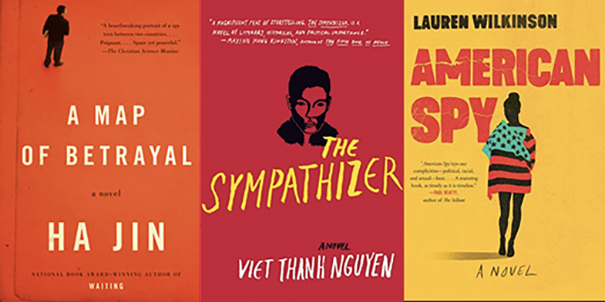
- This event has passed.
Matters of State: Literature & Espionage
Thu, May 27, 2021 @ 7:00 PM - 9:00 PM
$24 – $36
The MEP Literature Reading Group takes on three more spy novels
Why Spy Novels?
Spy novels emerged as a distinct genre around the time of World War I, coinciding with the creation of formal intelligence agencies in many countries. This was a period characterized by heightened concern on the part of rulers about national security, imperial strength, and the impending conflict of the Great War. Spy novels from the early twentieth century reflect these concerns, and generally feature secret agents and seemingly realistic tales of international intrigue. With the rise of fascism, spy novels shifted their focus to examine the dynamics of political movements within individual states, assessing their threats to the stability of the international political order. In these stories, the anxiety over the powerlessness of the individual is assuaged by the resourcefulness and ultimate success of exceptional or lucky individuals in confronting such harrowing problems as war, nuclear proliferation, and terrorism. The verisimilitude of spy novels written in the twentieth century is an integral part of the genre’s popularity; the genre often reflects political, economic, and cultural anxieties as well as showcasing advances in surveillance technology. You will see reference to The Human Factor by Graham Greene below. The group has read and discussed this novel during April.
THE HUMAN FACTOR (1978) • GRAHAM GREENE Greene aimed with this book to write a novel of espionage free from the violence that is more typical of the genre. Another theme Greene explored was Western capital’s hypocritical relations with South Africa under apartheid. He thought that even though some Western capitalists would often publicly oppose apartheid, those same holders of capital “simply could not let South Africa succumb to black power and (or) communism.”
A MAP OF BETRAYAL (2014) • HA JIN The protagonists of this novel occupy the “treacherous territory” of margins. Jin’s master spy is no 007 or George Smiley. What distinguishes Gary is his ordinariness, “his simple, casual fashion of conducting espionage.” A spare, haunting tale of conflicted loyalties that spans half a century in the entwined histories of two countries—China and the United States—and two families as it explores the complicated terrain of love and honor.
THE SYMPATHIZER (2015) • VIET THANH NGUYEN The anonymous narrator has an “acrobatic ability” that guides the reader through the contradictions of the Vietnam War and American identity. Set as a flashback in the coerced confession of a double agent, the book’s half-Vietnamese, half-French narrator recounts the fall of the US-allied South Vietnamese Government in 1975 and subsequent events as its top officials flee to American exile in Los Angeles.
AMERICAN SPY (2018) • LAUREN WILKINSON It’s 1986, the tail end of the Cold War, and Marie Mitchell has been tasked by the FBI with undermining Thomas Sankara, the revolutionary president of Burkina Faso whose communism has made him an American intervention target. The CIA wants Marie to ascertain how much Sankara knows about America’s involvement in his opposition, and possibly seduce him — Marie has misgivings, doubting the CIA’s motives, but accepts the job anyway. She doesn’t expect, however, to be won over by the revolutionary politician: “The way he could make you feel. It was like he saw a version of you that was even more perfect than the version you saw of yourself.”
Details
- Date:
- Thu, May 27, 2021
- Time:
-
7:00 PM - 9:00 PM
- Series:
- Matters of State: Literature & Espionage
- Cost:
- $24 – $36
- Event Categories:
- American Literature, China, Classes/Events, Emancipation, Literary Studies, Marxist Method, Radical Literature
- Event Tags:
- Espionage, Matters of State, Spying

